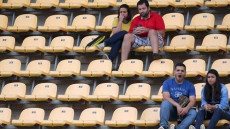A recent Kyoto University study showed that an ability to perceive differences between similar images depends on the cultural background of the viewer.
Scientists have long recognized that the mental processes behind thinking and reasoning differ between people raised in Western and Eastern cultures. Those in the West tend to use 'analytical' processing, analyzing objects independently of context, while those in the East see situations and objects as a whole, which is known as 'holistic' processing.
While such differences in processing are thought to affect visual perception, lead author Yoshiyuki Ueda believes that this view is overly simplistic.
"Reports about the effects of cultural differences on visual perception are inconsistent," said Ueda. "Partly, previous experiments have used relatively complex objects, resulting in a lot of 'noise'. We decided to simplify the visual task by using simple geometric figures."
Volunteers from Canada, the United States, and Japan were asked to look at groups of objects such as straight lines with varying properties and discern simple differences between them: angle and length, for example. In looking for the one odd line out of a group, North Americans took more time when the line was shorter, rather than if it was longer. No such differences were seen in Japanese volunteers, who in contrast had a significantly harder time identifying a straight line among tilted ones.
Such a stimulus-dependent cultural difference cannot be explained simply by analytic-holistic theory.
Senior researcher Jun Saiki noted that their next step is to find the cause of this discrepancy. One such reason may be the orthographical systems the subjects see regularly.
Saiki added, "In East Asian writing, many characters are distinguished by subtle differences in stroke length, while in Western alphabets, slight angular alterations in letters result in remarkable changes in the reading of words."
The study is published in the journal Cognitive Science.




